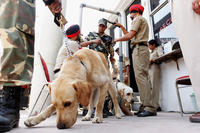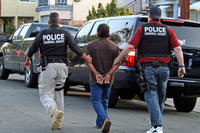-
Montgomery County adds drone to arsenal
For local police departments who do not have a helicopter unit or cannot afford one, small unmanned aerial vehicles (UAVs) are quickly becoming a cheap solution; the Montgomery County Sheriff’s Office in Texas recently purchased the ShadowHawk, a small remote controlled helicopter manufactured by Vanguard Defense Industries
-
-
Budget cuts force Nevada to reconsider security priorities
Next fiscal year Nevada will be forced to adapt to a 47 percent cut in DHS funding. To prepare for this new financial reality, Nevada governor Brian Sandoval has called for a reassessment of the state’s homeland security priorities
-
-
Prison systems vulnerable to cyberattack

At the recent Hackers Halted convention in Miami, researchers John J. Strauchs and his daughter Tiffany Strauchs Rad told the audience how with only $2,500 and some basic equipment, they were able to develop a cyberattack on a simulated prison computer system with potentially catastrophic results
-
-
DHS agents recover painting stolen by Nazis

Last week, federal DHS agents raided a museum in Tallahassee, Florida to recover a 500-year-old painting that was believed to be stolen by Nazis during the Second World War; upon receiving a tip from a foreign law enforcement source that the painting had been stolen by the Nazis, DHS agents seized the painting and will hold it until the rightful owner can be determined
-
-
One answer to the National Drug Threat Assessment Report: It’s the human component, stupid // by Lee Maril

The recent Department of Justice study of the impacts of illegal drugs upon our country, the National Drug Threat Assessment 2011 (NDTA2011), outlines significant challenges facing Customs and Border Patrol (CBP); a first step to directly addressing the NDTA2011 is to refrain from sending out a new batch of RFPs (request for proposal) to the usual defense contractors
-
-
Highly-trained Indian K-9s join counterterror forces

The Indo-Tibetan Border Police (ITBP) has a highly-trained unit in its force unlike any other in the world; police handlers have taught six Labradors to carry explosives in their teeth, sneak into terrorist lairs, plant remote-controlled bombs, hide secret cameras, interpret body language, and understand English and Hindi
-
-
Local police not required to detain illegals for ICE

Internal DHS documents reveal local law enforcement agencies are not required to hold undocumented immigrants when requested by the federal government; a coalition of groups against the controversial Secure Communities program obtained a total of three documents under a Freedom of Information request that clarified the policy of detainers for local law enforcement agencies
-
-
Mathematicians help LAPD fight gangs
UCLA mathematicians working with the Los Angeles Police Department to analyze crime patterns have designed a mathematical algorithm to identify street gangs involved in unsolved violent crimes
-
-
U.K. police technology allows tracking, controlling cell phones remotely
Civil rights groups in the United Kingdom are up in arms over the revelation that the U.K.’s largest police force, the Metropolitan Police, has acquired the technology to shut down cell phones remotely, intercept communications, and gather data on thousands of users in a targeted area
-
-
Law agencies want YouTube police brutality videos removed
In Google’s latest Transparency Report, the company revealed that there has been a 70 percent increase in requests by law enforcement agencies to remove police brutality videos from YouTube; according to the report, from January to June of 2011 the “number of content removal requests we received increased by 70 percent” compared to the period from July to December of 2010
-
-
BVS helps U.K. prisons detect cell phones
Berkeley Varitronics Systems (BVS) has made quite a splash in recent weeks announcing a new partnership to distribute its cell phone detection technology in the United Kingdom, adding several options to its line of multi-band transmitters, and teaming up with Los Angeles Laker Andrew Goudelock
-
-
Texas county police buys drone that can carry weapons

The police in Montgomery County — and area north of Houston, Texas — is the first local police in the United States to deploy a drone that can carry weapons; the police says it will be used in chases of escaping criminals and tracking drug shipments
-
-
Eight NY police officers charged for gun-smuggling

Eight police officers in New York City were charged on Tuesday for taking part in a gun-smuggling ring; the men stand accused of using their experience and authority to help illegally transport guns, slot machines, cigarettes, and counterfeit goods across state lines; among the items the men are accused of smuggling are twenty firearms including three M-16 assault rifles, a shotgun, and sixteen handguns
-
-
Riot police clear Oakland of Occupy Wall Street protestors
Early Tuesday morning, police officers clad in riot-gear arrested seventy-five people in Oakland, California as they cleared city hall of Occupy Wall Street protestors; the protestors had been camped out in front of Oakland’s city hall for about two weeks, before hundreds of police officers and sheriff’s deputies from more than a dozen local law enforcement agencies descended upon them firing tear gas and beanbag launchers
-
-
FBI training elite deep-diving counterterrorism unit
To bolster its counterterrorism capabilities, the FBI has created an elite group of special agents trained to track terrorism underwater
-
More headlines
The long view
How Male Grievance Fuels Radicalization and Extremist Violence
Social extremism is evolving in reach and form. While traditional racial supremacy ideologies remain, contemporary movements are now often fueled by something more personal and emotionally resonant: male grievance.
